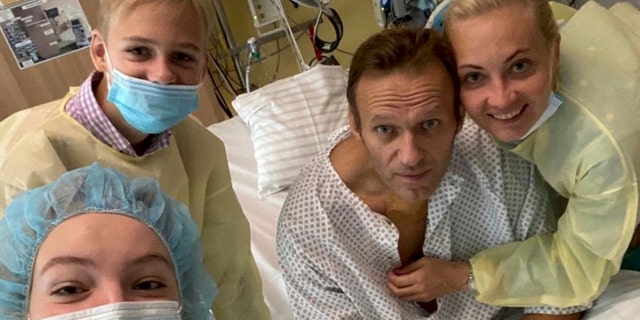Traces of the nerve agent Novichok were found on a bottle of water in Russian opposition leader Alexei Navalny’s hotel room in the Siberian city of Tomsk, his colleagues said Thursday.
It had been reported that the Kremlin critic was poisoned after drinking tea laced with the toxin at the airport before boarding a return flight to Moscow.
After falling ill on the plane, the pilot made an emergency landing in Omsk, where Navalny was hospitalized before being taken to Berlin two days later on a medevac plane.
In Germany, Navalny was kept in an induced coma for more than two weeks as he was treated with an antidote at Berlin’s Charite hospital.
Members of the outspoken politician’s inner circle immediately accused the Kremlin and Russian President Vladimir Putin of having a hand in the poisoning — an accusation Russian officials have vehemently denied.
The Kremlin has also shrugged off calls made by German Chancellor Angela Merkel to answer questions about the poisoning.
On Tuesday, Navalny posted a picture of himself from his hospital bed, with his wife and children by his side.
“I still can’t do almost anything on my own, but yesterday I managed to breathe on my own for the entire day,” he said.
“I still can’t do almost anything on my own, but yesterday I managed to breathe on my own for the entire day.”
A video posted on Navalny’s Instagram account on Thursday showed members of his team inspecting his hotel room in Tomsk before he left the city on Aug. 20 and collapsed on a flight home.
Navalny’s Instagram post said they went to the room an hour after learning that he had fallen ill, accompanied by a lawyer, and packed the bottles and other items for further inspection. In the video post, someone who appears to be a hotel employee could be heard telling members of the Navalny team that they need to ask police before taking any items from the room, and one of them answered they couldn’t do that.
“Two weeks later, a German laboratory found a trace of Novichok on a bottle from the Tomsk hotel room,” they said. “And then another three labs that took Alexei’s samples proved that he was poisoned with it. Now we understand: It was done before he left his room to go to the airport.”
There had been previous speculation that Navalny was poisoned at the airport, where he drank a cup of tea before boarding the flight.
RUSSIAN OPPOSITION LEADER ALEXEI NAVALNY SHARES PICTURE FROM HOSPITAL BED AFTER SUSPECTED POISONING
“We didn’t have much hope of finding something,” members of Navalny’s team said on Instagram. “But as it was absolutely clear to us that Navalny wasn’t just ‘slightly unwell’ or ‘under the weather’ and candy wouldn’t help, we decided to take everything that could hypothetically be of use and hand it over to doctors in Germany.”
They noted that they did so because they were aware that Russian authorities would be reluctant to launch a probe.
“It was quite obvious that they wouldn’t investigate the case in Russia,” they said. “And so it happened: nearly a month after, Russia hasn’t recognized that Alexei was poisoned.”

This handout photo, published by Russian opposition leader Alexei Navalny on his instagram account, shows himself, center, and his wife Yulia, right, posing for a photo with medical workers in a hospital in Berlin, Germany. He posted on Instagram Tuesday Sept. 15, 2020: “Hi, this is Navalny. I have been missing you. I still can’t do much, but yesterday I managed to breathe on my own for the entire day.” (Navalny instagram via AP)
His spokeswoman, Kira Yarmysh, tweeted that “Navalny had been poisoned with Novichok at the hotel before he went to the airport.”
But Lyubov Sobol, a top Navalny associate, later tweeted that while “traces of Novichok were found on a bottle from the hotel, it doesn’t mean that Navalny was poisoned specifically with the bottle.”
A German military lab determined that Navalny was poisoned with Novichok, the same class of Soviet-era agent that Britain said was used on former Russian spy Sergei Skripal and his daughter in Salisbury, England, in 2018.
Merkel has said the German lab conducted tests on “various samples from Mr. Navalny,” but neither she nor other German officials have elaborated.
On Monday, the German government said independent tests by labs in France and Sweden backed up its findings. The Hague-based Organization for the Prohibition of Chemical Weapons is also taking steps to have samples from Navalny tested at its designated labs.
The Kremlin has said that Russian doctors who treated him in Omsk found no sign that Navalny was poisoned. Russia has repeatedly prodded Germany to share Navalny’s analyses and other medical data and compare notes with the Russian doctors.
German officials have responded to Moscow’s request for evidence by saying that Russian authorities must have the samples already since Navalny spent two days in the Omsk hospital.
CLICK HERE FOR THE FOX NEWS APP
Russian Foreign Minister Sergey Lavrov, who canceled a scheduled trip Tuesday to Berlin, said in a TV interview earlier this week that Russian authorities have conducted a preliminary inquiry and documented the meetings Navalny had before falling ill, but he emphasized that investigators need to see evidence of poisoning to launch a full criminal probe.
Lavrov accused the West of trying to smear Russia and use the incident as a pretext for new sanctions against Moscow. He argued that Navalny’s life was saved by the pilots of the plane who quickly landed in Omsk after he collapsed on board and by the rapid action of doctors there — something he said Western officials have failed to recognize.
The Associated Press contributed to this report.